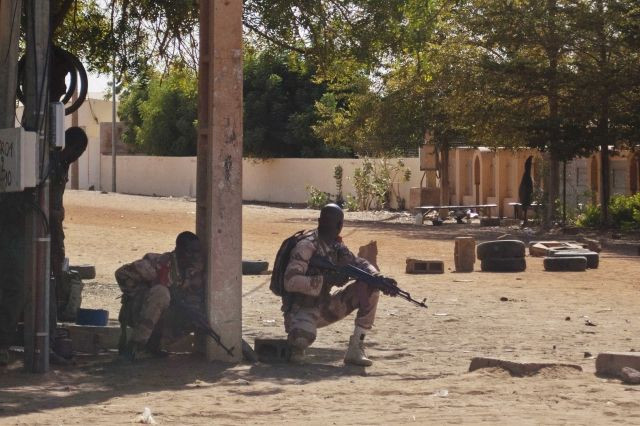Blast Rocks Northern Mali City Of Gao Hours After Firefight; Foreign Troops On Lookout For Militant Leaders

An explosion rocked the northern Mali city of Gao early Monday, hours after Malian troops and suspected Islamist militants exchanged heavy gunfire in an apparent retaliatory attack by the insurgents forced out of the city in a French-led military offensive just two weeks ago.
The Malian troops told the AFP that the blast appeared to have occurred at the military checkpoint at the city's northern entrance, where two suicide bombers blew themselves up Friday and Saturday.
The heavy firefight Sunday marked the first retaliatory attack launched by the rebels on a territory captured by the French-led forces.
The Movement for Oneness and Jihad in West Africa (MUJAO) claimed responsibility for the Sunday’s attack and for the suicide bombings, the AFP reported.
“Islamists who have infiltrated the town are trying to attack our positions, but we’re fighting back,” a Malian army officer told Reuters over the phone.
The French troops had recaptured the Islamist strongholds Gao, Timbuktu and Kidal by January end with virtually no combat or casualties, raising concern that the insurgents who were forced out of the region’s main towns may resort to guerilla warfare to strike back.
The fighting in the city started early Sunday afternoon when the Malian soldiers clashed with the Islamists in the centre of Gao, near an empty police station which served as a rebel base prior to the military offensive, the AFP report said.
A spokesman for MUJAO, one of the al-Qaeda-linked groups that had been in control of northern Mali for 10 months following a military coup in March 2012, told the AFP Sunday: "The combat will continue until victory, thanks to God's protection. The mujahideen are in the city of Gao and will remain there."
The former head of the British Army, General Sir Mike Jackson, had earlier warned that nations involved might face “protracted guerrilla warfare.”
“It doesn't really surprise me that the British Government feels it needs to be seen to be helping,” he told the BBC.
“We cannot let states fail because we know from recent history that failed states just lead to really difficult circumstances, instability. What Mali and France, and indeed other countries who may choose to assist may face, of course, is a protracted guerrilla warfare taking place away from the conurbations,” he said.
Meanwhile, the French forces, with a combat strength of about 4,000 and equipped with drones, jets, laser-guided bombs and wiretapping devices have embarked on a mission to hunt down the insurgents disappeared in their hideouts.
The U.S. is working with France to find the fugitives, including Mokhtar Belmokhtar, an Islamist leader, linked to the siege in an Algerian gas plant last month that left at least 37 people dead, including three Americans.
In the past 10 years, the 40-year-old rebel leader has raised tens of millions of dollars from kidnapping and other criminal enterprises to buy weapons and wage a holy war, the Wall Street Journal reported citing the U.S. officials.
The U.S. has sent surveillance planes to Mali and is considering a drone base in neighboring Niger.
© Copyright IBTimes 2025. All rights reserved.






















